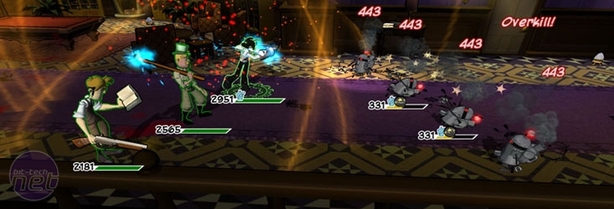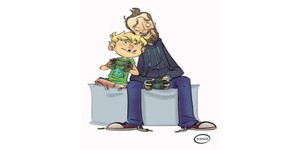
Gameplay
When you’re back the world of New Arcade, circa 1922, it isn’t really a surprise that the gameplay is roughly the same. It’s still you, Tycho and Gabe wandering around the same closed in, linear environments and marvelling at the surprising level of detail that’s been lavished upon it between scripted fights.Hell, some of the same locations are back too. You’ll still be making regular visits to the bedroom of a certain teenage girl-genius in the middle of the night (properly chaperoned by her uncle) and you’ll still be popping into the Startling Development central office to do things like change outfits, read dossiers and distract yourself.
That said, some things have changed. While the combat itself is essentially the same real-time-turn-based combination where you wait for your three main characters to charge their attacks before you unleash them, the minigames that drive the special attacks have changed.
For the player, your special hoe attack is now initiated by a simple ticker based game; press A when the arrow is in the green. Tycho’s shotgun, which he now prefers over the Tommy Gun, has a mini shooting gallery powering his super move. Gabe’s spiked knuckles have a small Dance Dance Revolution.
The weapons themselves are slightly different too, as have the NPCs who back you up in certain fights. That frustrating and only ever occasionally useful cat is gone, and while Anne Claire returns as a summonable attack her new attack is wholly more impressive. It’s like the steampunk version of the Soviet’s orbital drop in Red Alert 3.
Unfortunately, the same problems from Episode One are also present here and, though the comedy is sharp and witty it also starts to edge closer to the predictable and, frankly, tiring. At times it just feels slow and somewhat forced – a veneer that covers the utterly repetitive combat.
And, boy, is the combat repetitive. The enemies are all still delightful caricatures of the old, insane and self-righteous, but they run in cycles. Each area in the game has the same structure – walk forwards, open a crate, stumble into a group of unavoidable enemies, walk forwards. Rinse, repeat. The problem really is that there's only really one thing that the player can get their teeth properly stuck into since there's no active RPG-style gameplay and few actual puzzles to baffle over. That one thing is the combat and it just doesn't have enough variation in it. There's no room for players to adapt or manoeuvre and with no stats to fiddle with there's no option to put your own personal touch on the carnage.
There’s been some effort made to spice it up at points – enemies will now flee more often and battles sometimes become multi-levelled affairs that take longer than you might expect thanks to surprise attacks and ambushes. Essentially though, it’s still the same grind. You’re still pushing forwards through dozens of identical battles and unable to control the way you level up outside of the weapon upgrade choices – which rely on how many enemies you’ve defeated.
Normally, this lack of real improvement would be enough for us to dock Episode Two by a point or two, but we’re not sure that we can
 do that here. The game may be totally formulaic in the way it works still, but it still has a few merits. Most importantly, the game is only going to take you a few hours to finish, so the brevity means that the repetition never becomes truly unbearable.
do that here. The game may be totally formulaic in the way it works still, but it still has a few merits. Most importantly, the game is only going to take you a few hours to finish, so the brevity means that the repetition never becomes truly unbearable.Also, while the comedy as a whole tends to plateau fairly rapidly, there are some truly excellent peaks to be scaled in this humorous trek and the tone of the games writing is both infectious and enjoyable. The section when you first take your monkey combatant into the ring is superbly animated and both brow-lifting and heart-wrenching in equal, though brief proportions.
Once again, Penny Arcade Adventures is a slightly flawed, but still fun game; it’s chunkiness offset by it’s audaciousness and refined charm. It doesn’t truly excel at anything, but nor does it fail at anything either, so while it isn’t a must-have game by any stretch of the imagination, it’s still a tempting way to spend an afternoon.
What Our Scores Mean

MSI MPG Velox 100R Chassis Review
October 14 2021 | 15:04











Want to comment? Please log in.